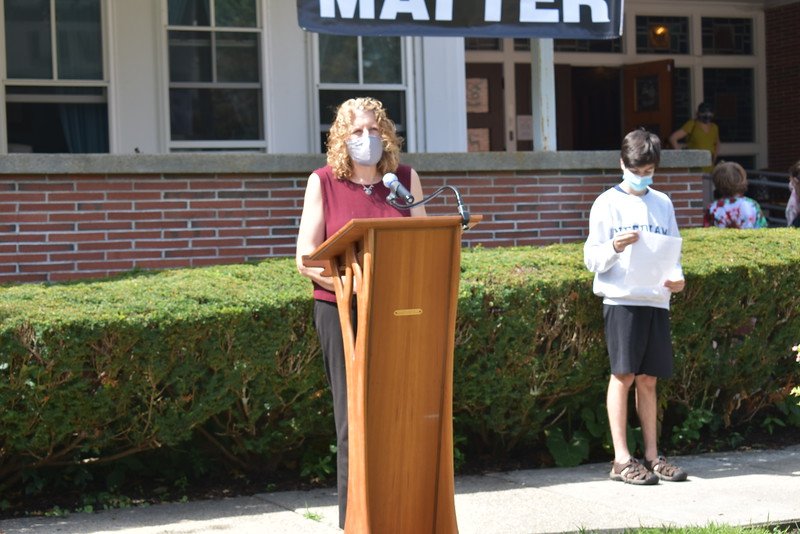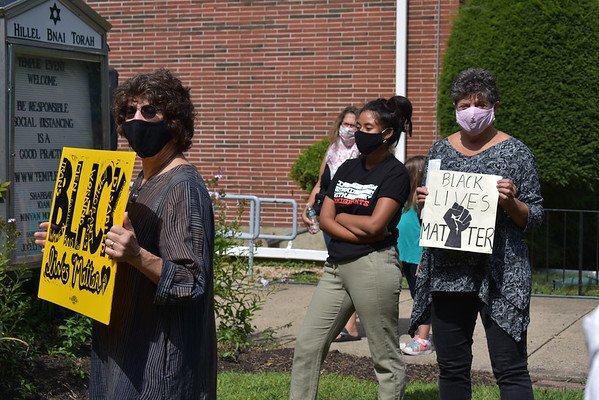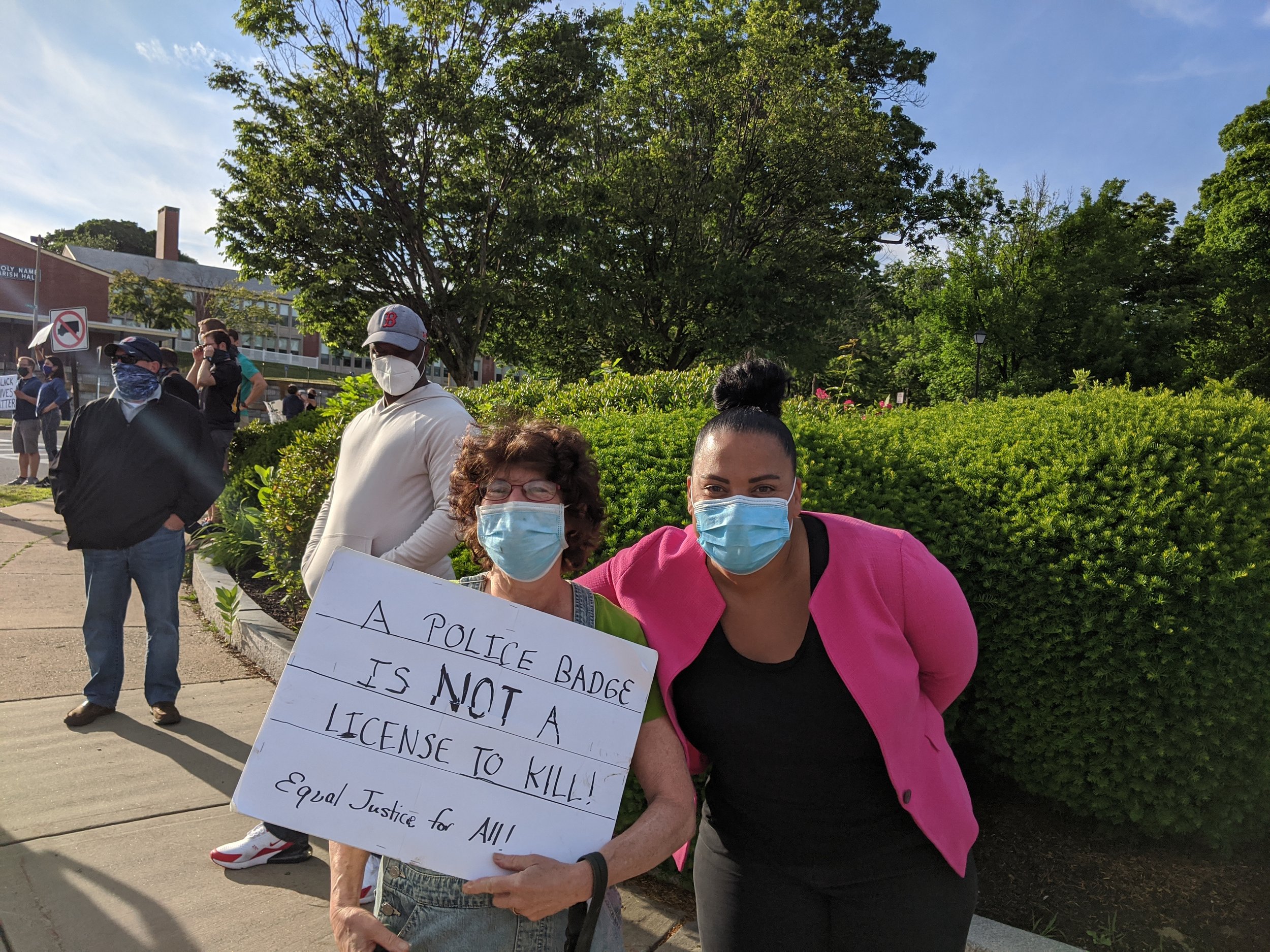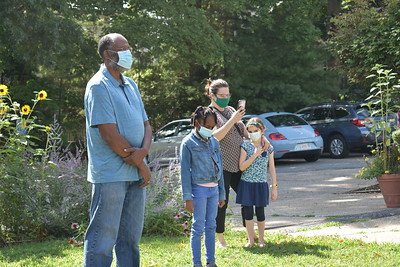WHAT DOES IT MEAN TO HAVE A “BLACK LIVES MATTER” SIGN IN OUR SYNAGOGUE?
From the HBT Statement of Purpose
Hillel B’nai Torah is a haimish community that is rooted in Jewish tradition and responsive to the world we live in. We actively engage our members in the creative process of bringing new perspectives to tradition and making tradition meaningful to contemporary lives.
HAVURAH (Community)
We welcome members of varied backgrounds into a warm and caring inter-generational community. We support each other through all of life’s stages and joyfully integrate children into all dimensions of temple life.
TIKKUN OLAM (Social Justice)
We enlist the active participation of all our members in hands-on efforts to nurture our community, mend our society, and protect our planet.
* * * * * * *
We are publicly committed to work for tzedek, justice.
That includes racial justice.
For the past two years, our community has provided a variety of forums for discussing racial injustice. For twenty years we have watched the number of multi-racial families grow, as more families and individuals of diverse backgrounds have found a home here. Thanks to contributions by and activism of our members, we have become a beacon of social justice in the Jewish community.
We are working internally to make our congregation a welcoming and safe place for all, including people of color.
HBT proudly asserts the diversity of our community as an asset. Our school and synagogue continually reflect on how we demonstrate and uphold that commitment to diversity, including on our walls, in our educational materials, in the ways we talk and the ways we listen. At HBT, “black” and “Jewish” are words that often describe a single family or individual, and our highest purpose is support our members and their spiritual journeys.
We are a community that takes seriously our engagement with Israel.
When the platform of the Movement for Black Lives came out in August, 2016, many Jews and others in our synagogue were disturbed by one section of the platform, referring to Israel’s relationship with the Palestinians as “genocide.” While we do not all agree on matters relating to Israel, this word, with its association with the Holocaust, causes deep pain for many Jews. Those who authored this section of the platform claim to be using “genocide” to mean cultural annihilation. We reject that language to describe the conflict in Israel-Palestine.
We believe in conversation and dialogue.
We also recognize that the platform was drafted as a call to conversation and to action on a variety of subjects. It is an in-depth, thoughtful document that names problems without apology and lays out clear strategies at all levels to address inequity and anti-black violence. It is not a “charter” and does not represent any organization. Therefore we are displaying the message of “Black Lives Matter,” not as an endorsement of the platform, but as a statement of our values and commitment.
With this sign, we welcome a conversation about the meaning of the words “Black Lives Matter.” We dare not shrink from our own identity as Jews. Jewish disagreements with the language should lead us to share our pain, ask questions, and continue to talk and work honestly with individuals associated with Black Lives Matters, to advance equity and justice in America for us all.
We are respectful of the many voices in our community and of its history.
The lobby of our synagogue is an area that invites conversation and engagement. From the earliest days of this congregation, when the Beth Torah Teens dedicated one of the stained glass windows to President John F. Kennedy and another to Eleanor Roosevelt, our members have expressed themselves about issues of the day on the walls of our synagogue. Today, we follow their example by displaying our congregation’s pursuit of justice in our own day, and with hope for a better future.
Tzedek, tzedektirdof
Justice, justice you shall pursue
A message from Rabbi Penzner and Miriam Messinger
Responding to the Platform of the Movement for Black Lives
Since the publication of the Platform of the Movement for Black Lives, the Jewish social justice world has been roiled with conflict. In the 40+ page platform, dedicated to the liberation and restructuring of American life in pursuit of equity in all realms, the Invest/Divest section of the platform identified the racism here in America with the suffering of Palestinians. That alone might not have caused such controversy, but, the word “genocide” was used to describe Israeli oppression of Palestinians.
For many of us who consider ourselves allies with this movement, that word caused deep pain. Reacting to that pain, several Jewish individuals and organizations made public statements that, in turn, created pain for other Jewish activists. Quickly taking sides condemning and supporting the platform, Jews voiced the fear and anger that lurks beneath the surface of American Jewry (particularly regarding Israel and Palestine), threatening to rend us asunder.
Desiring to support the movement and simultaneously feeling pushed away, I’ve spent this week confused and anxious.
In troubled times, how many of us know the best action to take, the right direction to follow, the way of truth?
In this week’s top-ten Torah portion (believe me, it has everything: the Shema, 10 Commandments, one of the 4 children of the seder, loads of verses that we quote in services), perhaps we can find some guidance:
It has been clearly demonstrated to you that the LORD alone is God; there is none beside God. (Deut. 4:35; the Rabbis chose this as the opening line of the Simchat Torah service)
In the Hasidic tradition, commentators read this text to mean “there is nothing beside God.” There is nothing but God. All is God.
From this idea, we can begin approach the divisions in our world, in the political realm, in our lives, even in our own minds, with more compassion. From this belief in ultimate interconnectedness, we can search beneath the surface to discover the truth that unites us. Even when we disagree.
Having spent a lot of time this summer in Israel and Palestine exploring what it means to live there, I witnessed ways that life under occupation resembles the problems of race in America. I also understand that they are very different situations, with Israel and Palestine entrenched in ongoing, mutual warfare. In addition, while I am not opposed to using the word “apartheid” in regard to practices in the West Bank, within its borders, Israel is not “an apartheid state.”
More problematically, the word “genocide” is a trigger word for Jews. I disagree with all my heart that it describes what Israelis are doing to Palestinians.
However, the Movement for Black Lives has a noble and expansive purpose that is not targeting Jews or the Jewish state. The essence of the platform is a sound call to action. It is worth a full discussion of its points. Jewish disagreements with the language should lead us to share our pain, ask questions, and continue to talk and work honestly with leaders of that movement to advance equity and justice in America.
Searching beneath the surface takes a lot more work than issuing statements. I do not condemn the Jewish leaders who spoke their pain or the writers whose pain was expressed in the platform. Nevertheless, to find the truth that surely resides in every person requires deep listening by all parties.
I invited Miriam Messinger to add her thoughts about this week’s controversy. Though we have different stories and have come to these issues from different vantage points, I believe we arrive at similar conclusions. Statements build walls; relationships tear them down. At the heart of the eternal covenant of the Jewish people is the commandment to find Oneness: to reach out and to listen and to discern the truth that we hear from others, uncomfortable as they may make us feel. Difficult as that is, that is the only viable path to Tikkun, healing and repair.
Rabbi Barbara Penzner
My support for a black-led liberation movement that asks us to transform how we as a society see, think about, and treat Black people within and beyond the boundaries of the United States and, more important, enact policies that can transform a violent history against African Americans is strong. It is even stronger after the release of the platform of the Movement for Black Lives. It is an in-depth, thoughtful document that names problems without apology and lays out clear strategies at all levels to address inequity and anti-Black violence.
I see the focus by the media and some Jews/Jewish organizations on the small piece about Israel-Palestine as a distraction from the platform and the work we as a country, and particularly white Americans, need to do. The attention to "the" Jewish reaction is actually an example of how privilege (in this case of Jews) amplifies one’s voice. There has been more focus on the Jewish response to the platform than on the platform itself. And we, as a community, could be doing a better job of sh'ma, listening.
I support people struggling with language and concepts that feel uncomfortable; leaning into discomfort is the only way to begin to dismantle racism. There is much in the platform besides the critique of Israeli government policies that probably make many white people uncomfortable. This is an opportunity to do the pausing and reflecting, with friends and in community, to examine our discomfort and to work through it so that we can be true and effective allies.
I am pained, however, that people are calling a critique of Israel anti-Semitic. I am pained, however, that this has been used by some Jewish leaders and groups as a time to say who and how we stand or don’t stand with a movement for Black Lives. Even if one disagrees with one or two words (genocide and apartheid), it is only privilege that makes it legitimate to then distance from a collaborative and massive change movement.
I believe it is our obligation to get in the work and be in relationship with individuals –it is through those relationships that we will learn and transform and be in more equal relationship. In fact, at this moment, I believe that just remaining silent or focusing only on the Israel/Palestine component of this impressive call to action makes us complicit in the anti-Blackness the the Movement is lovingly calling on us to shed. I don’t pretend that anti-Semitism does not exist in the world but I prioritize right now the movement that is addressing daily and deadly outcomes of anti-Black violence and policy that affect me and us as a community, and affect my family directly.
Miriam Messinger
Black Lives Matter (BLM) and Anti-racist work
We encourage all our members to fight for racial justice and for HBT to become an anti-racist congregation. The BLM banner states our commitment publicly. We hold discussion groups and forums, have sponsored workshops on Anti-racism and Anti-Semitism, and joined at weekly vigils in West Roxbury to raise our voices.
Criminal Justice/Second Chance Justice Campaign
We seek clemency for William Allen who has been serving a life sentence without parole for 27 years. With the Brockton Interfaith Committee and other Jewish congregations, we have rallied, written letters and made donations to compel the Governor to grant clemency to this inspiring individual. We also seek to address the disproportionately high percentage of life sentences without parole in Massachusetts.
Mothers Day Walk for Peace
We march annually as a contingent and raise funds for the Louis D. Brown Peace Institute services, advocacy and training to create more peaceful communities.






